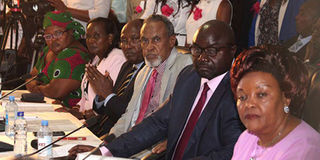Give Kenyans a chance to choose between BBI and Punguza Mizigo

Building Bridges Initiative (BBI) committee meets with women's group Embrace Kenya at KICC, Nairobi, on August 8, 2019. The BBI is owned by the political class and anchored by Mr Uhuru Kenyatta and Mr Raila Odinga. PHOTO | FILE | NATION MEDIA GROUP
What you need to know:
- The BBI proposes to repoliticise government decision-making and service by giving back the president or PM the power to make MPs ministers.
- Punguza Mizigo petition continues the struggle for fair distribution of resources and inclusivity started by federalist Kadu against centralist Kanu in 1960.
The Building Bridges Initiative team has not published its report.
But those plugging it have given away plenty. When I read that a BBI-based referendum is imminent, four issues came to mind.
One, in 2010, Kenyans through the Constitution sought to depoliticise government decision-making by removing MPs from the Cabinet and replacing them with technocrats and experts. Why?
Because politics, often to the disadvantage of the deserving but politically weak, pushed decisions advantageous to the politically strong, to serve vested interests. The result was skewed development.
Two, the Constitution denied the President a lever of patronage. It removed from the office the power to appoint ministers from MPs.
Henceforth, MPs would only legislate, represent and provide oversight as the Executive and public service executed.
VESTED INTERESTS
The idea was that MPs canvassed to be ministers, positions that gave them power to fight for the development of their constituencies, solicit favours from the President and intimidate rivals.
Ministerial cars became symbols of a community’s participation in national affairs, acceptance into government and to be recipient of development.
President Moi always reminded communities how many of their sons were ministers.
But ministers were seldom in Parliament. They were fawned over by favour-seeking backbenchers when present. Their answers to questions were evasive.
And they were a conundrum. As ministers, they were the Executive; yet as MPs they were to oversee the actions of that Executive.
Ministers fought senior civil servants, demanding jobs and tenders for their electors or pork to take home.
DEVOLUTION
A permanent secretary once briefed editors on newly-arrived Mrs Charity Ngilu being the boss from hell!
For resisting her meddling, he was jettisoned from Afya House. At Maji House, Mrs Ngilu and her assistant Mwangi Kiunjuri furiously fought over tenders.
Three, during the 2003-5 Bomas constitution-making, the premiership and devolution were the most contentious issues. The push was the reason the process was scuttled.
Justice and Lands ministers Kiraitu Murungi and Amos Kimunya respectively, argued that two centres of power were a recipe for instability and that devolution would balkanise Kenya.
Four, the clamour for devolution drove home the point that the age-old struggle for fair distribution of resources was well worth continuing.
REPOLITICISE AGENDA
So, what will the plebiscite be about? First, BBI is owned by the political class and anchored by Mr Kenyatta and Mr Raila Odinga flanked by the leadership of the main parties.
Unsurprisingly, BBI proposes to repoliticise government decision-making and service by giving back the president or PM the power to make MPs ministers. Why Kiunjuri and Eugene Wamalwa made ministers?
The one to help the President fight corruption-based political wars waged by Mr Odinga. The other to help the governing party make inroads in western Kenya.
Ministers will serve politics again. President or premier will wield ministerial appointments and dismissals as sweeteners and frighteners again.
Second, the dominant political class, fearing a premiership would dilute the presidency, killed Bomas. The class that believed it was just about to bag the presidency chose the presidential system over the parliamentary in 2010.
PUNGUZA MIZIGO
Having failed twice, it now says the presidential system has failed.
Why not just go parliamentary since the dysfunctional 2008–13 Kibaki-Odinga coalition proved the wrecked Bomas draft right?
Third, Thirdway's Punguza Mizigo (change the constitution) petition is a masterpiece. It continues the struggle for fair distribution of resources and inclusivity started by federalist Kadu against centralist Kanu in 1960.
The BBI seeks to expand the Executive to create fat-cat and top-dog jobs for the political class. Punguza Mizigo proposes to trim government, representation and profligate spending.
It seeks to entrench inclusivity by making the ward the fulcrum of development.
Three issues therefore arise. One, Punguza Mizigo cannot be wished away. Kenyans deserve a chance to choose between it and BBI.
Two, the areas of the Constitution that merit rethinking are manifold. They cannot be subsumed under a single issue, yes or no, question.
Last, because Parliament is BBI-occupied territory, Kenya needs a national conference to deliberate on how to execute the referendum.





